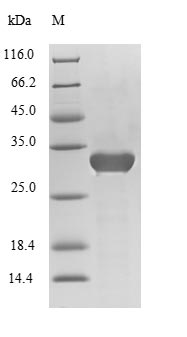Recombinant Mouse Chymotrypsin-like elastase family member 3B (Cela3b) is produced using an E.coli expression system, covering the full length of the mature protein from amino acids 28 to 269. The protein carries an N-terminal 10xHis-tag and a C-terminal Myc-tag, which should make detection and purification more straightforward. SDS-PAGE analysis shows the product achieves greater than 90% purity, suggesting it's well-suited for various research applications.
Cela3b appears to be a serine protease that's involved in protein digestion and processing. It likely plays a critical role in breaking down dietary proteins within the digestive system. The protein belongs to the trypsin family of proteases, which are known for their ability to cleave peptide bonds. Scientists frequently study this protein when investigating digestive enzyme function and regulation, making it an important target in enzymology and digestive system research.
Potential Applications
Note: The applications listed below are based on what we know about this protein's biological functions, published research, and experience from experts in the field. However, we haven't fully tested all of these applications ourselves yet. We'd recommend running some preliminary tests first to make sure they work for your specific research goals.
Mouse Cela3b is a serine protease that requires precise folding, proper disulfide bond formation, and activation through proteolytic cleavage for its enzymatic activity. The E. coli expression system cannot perform the necessary post-translational modifications (particularly proper disulfide bonding and activation cleavage) that are critical for this enzyme's native conformation. The dual N-terminal His-tag and C-terminal Myc-tag may sterically interfere with the protein's active site and proper folding. While the protein may be soluble, it is highly unlikely to achieve the correct folding needed for functional protease activity.
1. Antibody Development and Validation Studies
This recombinant Cela3b serves as an excellent immunogen for generating antibodies against linear epitopes of mouse chymotrypsin-like elastase 3B. The full-length mature sequence ensures comprehensive epitope coverage. The dual tags facilitate purification and provide additional epitopes for screening. However, antibodies may not efficiently recognize conformational epitopes on the native, properly folded, and activated enzyme.
2. Structural and Biophysical Studies
This is the essential first step to assess the protein's physical properties. Techniques like size-exclusion chromatography can determine oligomeric state, while circular dichroism can analyze secondary structure content and thermal stability. These studies provide critical quality control data but characterize a misfolded protein, not native Cela3b.
Final Recommendation & Action Plan
The E. coli expression system is fundamentally unsuitable for producing a functional version of this complex serine protease, limiting applications to non-functional uses. The immediate priority is Application 2 (Biophysical Studies) to assess the protein's physical properties through SEC and CD spectroscopy. Application 1 (Antibody Development) can proceed immediately for generating linear epitope antibodies. For functional Cela3b studies, alternative approaches using eukaryotic expression systems (e.g., insect or mammalian cells) that support proper disulfide bond formation and proteolytic activation are essential.






